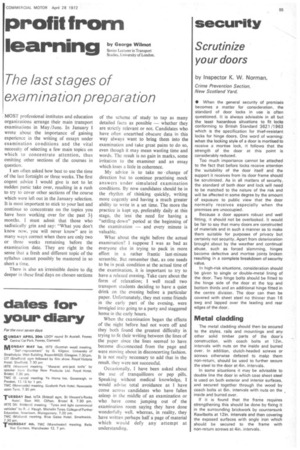profit from learning
Page 57

If you've noticed an error in this article please click here to report it so we can fix it.
The last stages of examination preparation
MOST professional institutes and education organizations arrange their main transport examinations in May /June. In January I wrote about the importance of gaining experience in the writing of essays under examination conditions and the vital necessity of selecting a few main topics on which to concentrate attention, thus omitting other sections of the courses in question.
I am often asked how best to use the time of the last fortnight or three weeks. The first cogent advice I would give is not to let sudden panic take over, resulting in a rush to try to cover other sections of the course which were left out in the January selection. It is most important to stick to your last and continue to concentrate on the topics you have been working over for the past 3-1 months. I must admit that those who sadistically grin and say: "What you don't know now, you will never know" are in many ways correct when there are only two or three weeks remaining before the examination date. They are right in the sense that a fresh and different topic of the syllabus cannot possibly be mastered in so short a time.
There is also an irresistible desire to dig deeper in these final days on chosen sections of the scheme of study to tap as many detailed facts as possible — whether they are strictly relevant or not. Candidates who have often unearthed obscure data in this way always want to bring them into the examination and take great pains to do so, even though it may mean wasting time and words. The result is no gain in marks, some irritation to the examiner and an essay which loses a little in coherence.
My advice is to take no change of direction hut to continue practising mock. answers under simulated examination conditions. By now candidates should be in the rhythm of thinking quickly, writing more cogently and having a much greater ability to write in a set time. The more the practice is kept up, preferably daily at this stage, the less the need for having a "settling down" period at the beginning of the examination — and every minute is valuable.
What about the night before the actual examination? I suppose I was as bad as everyone else in trying to pack in more effort in a rather frantic last-minute scramble. But remember that, as one needs to be in peak condition at the actual time of the examination, it is important to try to have a relaxed evening. Take care about the form of relaxation; I well recall two transport students deciding to have a quiet drink on the evening before a particular paper. Unfortunately, they met some friends in the early part of the evening, were inveigled into going to a party and staggered home in the early hours.
When the examination began the effects of the night before had not worn off and they both found the greatest difficulty in trying to fit their writing between the lines of the paper since the lines seemed to have become disconnected from the page and were moving about in disconcerting fashion. It is not really necessary to add that in the result they were not successful.
Occasionally, I have been asked about the use of tranquillizers or pep pills. Speaking without medical knowledge, I would advise total avoidance as I have come across candidates who have fallen asleep in the middle of an examination or who have come jumping out of the examination room saying they have done wonderfully well, whereas, in reality, they have written perhaps half a page of material which would defy any attempt at understanding.








































































































